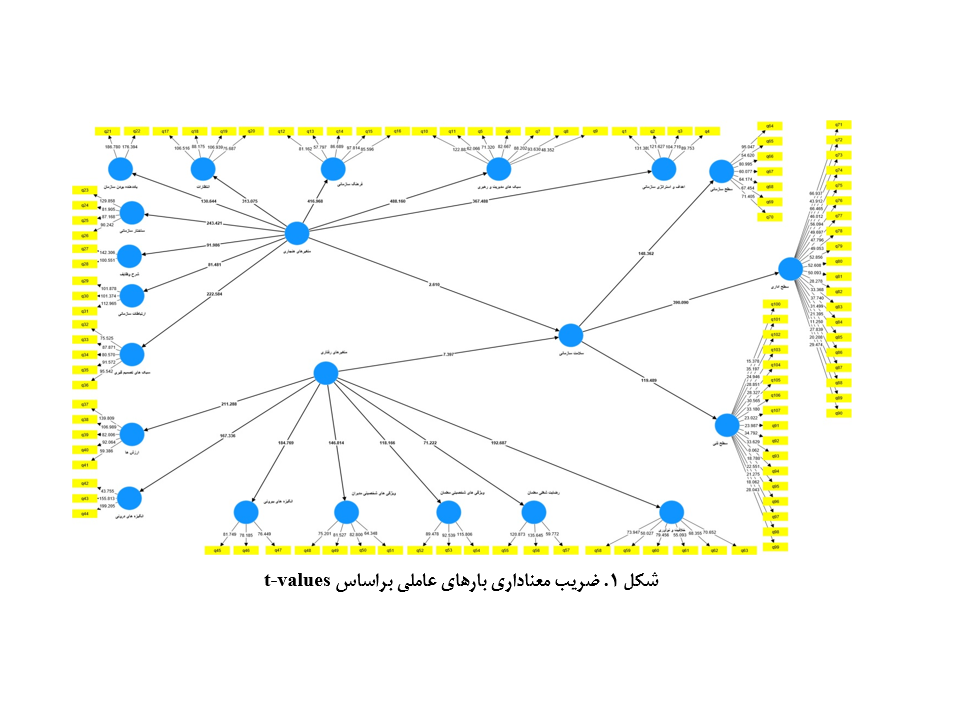Validation of the Organizational Health Model in Primary Schools of Babil Province, Iraq
Keywords:
Organizational health, organizational goals and strategies, organizational culture, job satisfaction, creativity, and innovationAbstract
This study aimed to validate the organizational health model in primary schools of Babil Province, Iraq. The research is quantitative-descriptive in terms of data collection methods and applied in terms of purpose. The statistical population included all principals of primary schools in Babil Province, Iraq. Accordingly, the sample size was determined to be 380 individuals, based on the Morgan and Krejcie table. The sampling method used was random sampling. To collect data, the standard Organizational Health Questionnaire developed by Hoy and Feldman (1996) and a researcher-designed questionnaire were employed. Cronbach's alpha was used to calculate reliability, which yielded a value of 0.90. Data analysis was conducted using structural equation modeling with the help of AMOS and PLS software. The results indicated that normative variables, with a path coefficient of 0.240, have an approximately 24% direct and positive effect on the organizational health of primary schools in Babil Province, Iraq. This means that higher levels of normative variables correspond to improved organizational health in these schools, and vice versa. Behavioral variables, with a path coefficient of 0.650, have an approximately 65% direct and positive effect on the organizational health of primary schools in Babil Province, Iraq. This indicates that higher levels of behavioral variables lead to an increase in organizational health.
Downloads
References
Hawkins GT, Chung CS, Hertz MF, Antolin N. The school environment and physical and social‐emotional well‐being:
implications for students and school employees. Journal of School Health. 2023;93(9):799-812. doi: 10.1111/josh.13375.
Widarko A, Anwarodin MK. Work motivation and organizational culture on work performance: Organizational
citizenship behavior (OCB) as mediating variable. Golden Ratio of Human Resource Management. 2022;2(2):123-38. doi:
52970/grhrm.v2i2.207.
Darling-Hammond L, DePaoli J. Why school climate matters and what can be done to improve it. State Education
Standard. 2020;20(2):7.
Storey KE, Montemurro G, Flynn J, Schwartz M, Wright E, Osler J, et al. Essential conditions for the implementation
of comprehensive school health to achieve changes in school culture and improvements in health behaviours of students. BMC
Public Health. 2016;16:1-11. doi: 10.1186/s12889-016-3787-1.
Capone V, Joshanloo M, Park MSA. Burnout, depression, efficacy beliefs, and work-related variables among school
teachers. International Journal of Educational Research. 2019;95:97-108. doi: 10.1016/j.ijer.2019.02.001.
Fu C, Ouyang M, Liu X, Xu G, Wang H, Ye Z, et al. The role of school organizational conditions in teacher
psychological resilience and stress during COVID-19 pandemic: A moderated mediation model. Frontiers in Psychology.
;13:1047831. doi: 10.3389/fpsyg.2022.1047831.
Sadat Mousavi S, Ebrahimi A. Structural Model of the Effect of Psychological Capital on Innovative Behavior in
Teaching: The Mediating Role of Conscientiousness Personality Trait. International Journal of Education and Cognitive
Sciences. 2024;4(4):1-10. doi: 10.61838/kman.ijecs.4.4.1.
Zweeris K, Tigelaar EH, Janssen FJJM. Studying curriculum orientations in teachers' everyday practices: A goal
systems approach. Teaching and Teacher Education. 2023;122:103969. doi: 10.1016/j.tate.2022.103969.
Altıntaş M, Özata M. Researching the relationship between organizational health and whistleblowing behavior:
education and health organizations version. Journal of International Health Sciences and Management. 2020;6(10):12-34. doi:
48121/jihsam.788565.
Ardıç K, Polatcı S. An integrated view of employee welfare and organizational effectiveness: Organizational health.
İktisadi ve İdari Bilimler Dergisi. 2007;21(1):139.
Özgenel M, Aksu T. The power of school principals' ethical leadership behavior to predict organizational health.
International Journal of Evaluation and Research in Education. 2020. doi: 10.11591/ijere.v9i4.20658.
Crosby M. Examining the relationship between organizational health and faculty satisfaction in institutions of higher
education: Indiana State University; 2022.
Panchal N, Cox C, Rudowitz R. The landscape of school-based mental health services. Menlo Park, CA: Kaiser Family
Foundation; 2022.
Jalilpour M, editor Examining the Relationship Between Organizational Health and the Happiness of Teachers in
Mahabad County Schools. International Conference on Interdisciplinary Studies in Management and Engineering; 2022.
Alipour F, Rahimi M, Asabat Tabari E. Factors Affecting School Organizational Health: The Role of Leadership and
Organizational Trust. Educational and School Studies. 2022;11(4):31-56.
Salmabadi A, Hamel Oa-B, Ahmadi S, Daneshfar M. The Role of Psychological Capital in Organizational Health
With the Mediation of Organizational Virtue. Islamic Studies in Health. 2022;6(3):27-38.
Hejazi A, Farajollahi Moghadam H, Karimi M. Predicting School Organizational Health Through Transformational
Leadership and Entrepreneurial Spirit. Theory and Practice in Teacher Education (New Strategies in Teacher Education).
;8(13):149-72.
Alizadeh B, Nasti Zaie N. Examining the Relationship Between Organizational Health and Organizational Virtue
With the Mediation of Organizational Justice. Bioethics Journal. 2019;9(32):33-45.
Dehghani S, Mohammadi R. Examining the Relationship Between Teachers' Academic Optimism, Organizational
Health, and School Effectiveness in Elementary Board and Regular Schools. Research in Elementary Science Education.
;1(2):43-56.
Velarde JM, Ghani MF, Adams D, Cheah JH. Towards a healthy school climate: The mediating effect of
transformational leadership on cultural intelligence and organisational health. Educational Management Administration &
Leadership. 2022;50(1):163-84. doi: 10.1177/1741143220937311.
Kirchhoff S, Dadaczynski K, Pelikan JM, Zelinka-Roitner I, Dietscher C, Bittlingmayer UH, et al. Organizational
health literacy in schools: concept development for health-literate schools. International Journal of Environmental Research
and Public Health. 2022;19(14):8795. doi: 10.3390/ijerph19148795.

Downloads
Published
Submitted
Revised
Accepted
Issue
Section
License
Copyright (c) 1403 Journal of Study and Innovation in Education and Development

This work is licensed under a Creative Commons Attribution-NonCommercial 4.0 International License.










